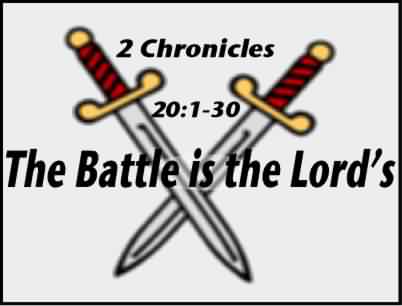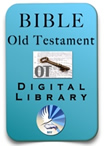 |
Introduction to Prayer: 2 Chronicles 20:1-30
A) The Urgent Need for Prayer (2 Chronicles 20:1-2) B) The Proper Time for Prayer (2 Chronicles 20:3-4) C) The Needed Substance of Prayer (2 Chronicles 20:5-13) D) The Delightful Answer to Prayer (2 Chronicles 20:14-19) E) The Required Faith for Prayer (2 Chronicles 20:20-23) F) The Blessed Reward of Prayer (2 Chronicles 20:24-30) Summary on Prayer Study Questions on 2 Chronicles 20:1-30 |
Bible Study Questions
2 Chronicles 20:1-30
1. Why does God put Old Testament stories like 2 Chronicles 20 in the Bible?
A) The Urgent Need for Prayer (2 Chronicles 20:1-2)
Difficulties lead us back to God.
Now it came about after this that the sons of Moab and the sons of Ammon, together with some of the Meunites, came to make war against Jehoshaphat. Then some came and reported to Jehoshaphat, saying, “A great multitude is coming against you from beyond the sea, out of Aram and behold, they are in Hazazon-tamar (that is Engedi) (2 Chronicles 2:1-2). (NASB)
2. What threat came against Jehoshaphat, the king of Judah? What made the threat so serious?
3. Who were those that made that threat (cf. Genesis 19:36-38)? Where were they located?
4. Have you ever encountered a foe that overwhelmed your resources? How did you respond?
B) The Proper Time for Prayer (2 Chronicles 20:3-4)
Fears always should lead us to trust God.
And Jehoshaphat was afraid and turned his attention to seek the LORD; and proclaimed a fast throughout all Judah. So Judah gathered together to seek help from the LORD; they even came from all the cities of Judah to seek the LORD (2 Chronicles 20:3-4).
5. What was King Jehoshaphat’s immediate response? How did he respond to this threat?
6. Was Jehoshaphat’s fear okay? What is the difference between this reaction and long-term fear?
7. State the words ‘seek the LORD’ in your own words. What does a person do to get from the fear stage to the ‘seek the Lord’ stage? What actual steps are taken?
8. What was good about Jehoshaphat’s response in relationship to the people he served? How did the people respond to him?
C) The Needed Substance of Prayer (2 Chronicles 20:5-13)
Prayer is where our trust is given to God.
Then Jehoshaphat stood in the assembly of Judah and Jerusalem, in the house of the LORD before the new court, and he said, “O LORD, the God of our fathers, art Thou not God in the heavens? And art Thou not ruler over all the kingdoms of the nations? Power and might are in Thy hand so that no one can stand against Thee.
“Didst Thou not, O our God, drive out the inhabitants of this land before Thy people Israel, and give it to the descendants of Abraham Thy friend forever? And they lived in it, and have built Thee a sanctuary there for Thy name, saying, ‘Should evil come upon us, the sword, or judgment, or pestilence, or famine, we will stand before this house and before Thee (for Thy name is in this house) and cry to Thee in our distress, and Thou wilt hear and deliver us.’
“And now behold, the sons of Ammon and Moab and Mount Seir, whom Thou didst not let Israel invade when they came out of the land of Egypt (they turned aside from them and did not destroy them), behold how they are rewarding us, by coming to drive us out from Thy possession which Thou hast given us as an inheritance. O our God, wilt Thou not judge them? For we are powerless before this great multitude who are coming against us; nor do we know what to do, but our eyes are on Thee.” And all Judah was standing before the LORD, with their infants, their wives, and their children (2 Chronicles 20:5-13).
9. From your own knowledge, what are the parts of prayer? What parts are seen here in the king’s prayer?
10. Can a person pray without faith? Explain. Do you ever find times when you find yourself praying without really talking to the Lord?
11. How did Jehoshaphat show through his prayers that he was really talking to the Lord?
12. What promise did Jehoshaphat refer to in verses 5-9? Refer to 2 Chronicles 6-7 for a background if necessary.
13. Why is it important to seek God’s will? How do we know Jehoshaphat was seeking God’s will?
14. Application: Do you regularly seek God in His Word? What is holding you back? What are you asking Him now? If it is not His will, do you really want those things? What are some things that God wants that you are not seeking Him for? Why not?
D) The Delightful Answer to Prayer (2 Chronicles 20:14-19)
Answers to prayer come when God speaks.
Then in the midst of the assembly the Spirit of the LORD came upon Jahaziel the son of Zechariah, the son of Benaiah, the son of Jeiel, the son of Mattaniah, the Levite of the sons of Asaph; and he said, “Listen, all Judah and the inhabitants of Jerusalem and King Jehoshaphat: thus says the LORD to you, ‘Do not fear or be dismayed because of this great multitude, for the battle is not yours but God’s.
‘Tomorrow go down against them. Behold, they will come up by the ascent of Ziz, and you will find them at the end of the valley in front of the wilderness of Jeruel. You need not fight in this battle; station yourselves, stand and see the salvation of the LORD on your behalf, O Judah and Jerusalem.’ Do not fear or be dismayed; tomorrow go out to face them, for the LORD is with you.” And Jehoshaphat bowed his head with his face to the ground, and all Judah and the inhabitants of Jerusalem fell down before the LORD, worshiping the LORD. And the Levites, from the sons of the Kohathites and of the sons of the Korahites, stood up to praise the LORD God of Israel, with a very loud voice (2 Chronicles 20:14-19).
15. How did God speak to Jehoshaphat? How does God speak to His people today?
16. What is the first thing that God spoke to Jehoshaphat about (v. 14-15)? How did this help him?
17. What instructions did God give to the king? Was this easy or hard to do?
18. Optional: Some people object to the free salvation ‘believe only and you will be saved’ offer because it is too easy? Why do they think this? Is it really so easy? Compare with Jehoshapat’s situation.
19. Application: Have you ever scoffed at God’s ‘easy way’? Will you now believe and obey? Tell the Lord no matter what He asks, you will do it. Then do it!
E) The Required Faith for Prayer (2 Chronicles 20:20-23)
We always are asked to prove our faith.
And they rose early in the morning and went out to the wilderness of Tekoa; and when they went out, Jehoshaphat stood and said, “Listen to me, O Judah and inhabitants of Jerusalem, put your trust in the LORD your God, and you will be established. Put your trust in His prophets and succeed.”
And when he had consulted with the people, he appointed those who sang to the LORD and those who praised Him in holy attire, as they went out before the army and said, “Give thanks to the LORD, for His lovingkindness is everlasting.” And when they began singing and praising, the LORD set ambushes against the sons of Ammon, Moab, and Mount Seir, who had come against Judah; so they were routed. For the sons of Ammon and Moab rose up against the inhabitants of Mount Seir destroying them completely, and when they had finished with the inhabitants of Seir, they helped to destroy one another. (2 Chronicles 20:20-23).
20. So how did the king respond to the Lord’s order? Did he do it?
21. The king did something that was within God’s order but a little different. What was this?
22. Why is praise and declaration of God’s greatness so important during such critical times?
23. The Lord challenges our faith and gives us something to do as we seek His wisdom. Can you share some experiences, either dramatic or typical of daily life that fit into this way the Lord deals with His people?
F) The Blessed Reward of Prayer (2 Chronicles 20:24-30)
God always blesses those who seek Him.
When Judah came to the lookout of the wilderness, they looked toward the multitude; and behold, they were corpses lying on the ground, and no one had escaped. And when Jehoshaphat and his people came to take their spoil, they found much among them, including goods, garments, and valuable things which they took for themselves, more than they could carry. And they were three days taking the spoil because there was so much.
Then on the fourth day they assembled in the valley of Beracah, for there they blessed the LORD. Therefore they have named that place “The Valley of Beracah” until today. And every man of Judah and Jerusalem returned with Jehoshaphat at their head, returning to Jerusalem with joy, for the LORD had made them to rejoice over their enemies. And they came to Jerusalem with harps, lyres, and trumpets to the house of the LORD.
And the dread of God was on all the kingdoms of the lands when they heard that the LORD had fought against the enemies of Israel. So the kingdom of Jehoshaphat was at peace, for his God gave him rest on all sides (2 Chronicles 20:24-30).
24. What did the king and the Israelites do? What did they see from the lookout? How did it compare to what God promised?
25. What did they call that valley? What does it mean and why do you think they have called it that? Are there any other examples of special places that got names to remind a person of God’s mighty work? How about in your life?
26. List the benefits from obedience. What did they do on the fourth day?
27. Application: What would you tell someone form this passage and your own life experience someone who told you, “Yea, I would like to meet God in this way but I don’t know how.”
This is the end of the study on 2 Chronicles 20: See Psalm 63 for another study on prayer.
Introduction to Prayer: 2 Chronicles 20:1-30
A) The Urgent Need for Prayer (2 Chronicles 20:1-2) Difficulties lead us back to God.
B) The Proper Time for Prayer (2 Chronicles 20:3-4) Fears always should lead us to trust God. C) The Needed Substance of Prayer (2 Chronicles 20:5-13) Prayer is where our trust is given to God.
D) The Delightful Answer to Prayer (2 Chronicles 20:14-19) Answers to prayer come when God speaks.
E) The Required Faith for Prayer (2 Chronicles 20:20-23) We always are asked to prove our faith.
F) The Blessed Reward of Prayer (2 Chronicles 20:24-30) God always blesses those who seek Him.
Study Questions on 2 Chronicles 20:1-30
 Most of BFF articles such as this one is nicely formatted for printing. Check out the great number of articles on the BFF Biblical Training Libraries all for one low cost. Make sure you check out the deal! Most of BFF articles such as this one is nicely formatted for printing. Check out the great number of articles on the BFF Biblical Training Libraries all for one low cost. Make sure you check out the deal! |